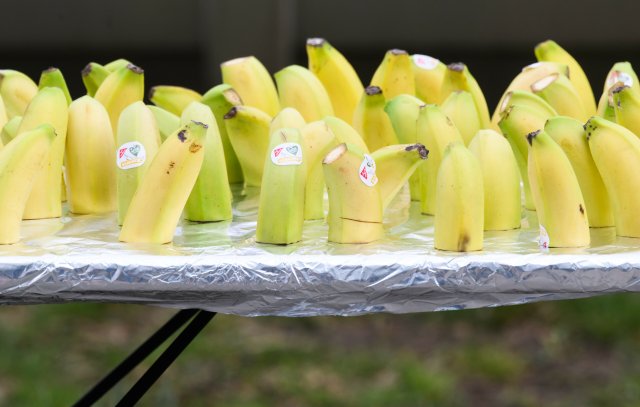Triathlon fast food: half bananas at a catering stand
Photo: dpa/Julian Stratenschulte
Prof. Heydenreich, I will take part in my first triathlon in September – as an absolute beginner – and ask me: What would be the biggest mistake in my diet on the way there?
If it is your first triathlon, I wouldn’t experiment too much. So don’t try ketogenic diet or interval fasting. Better to orientate on classic nutritional recommendations for endurance sports: carbohydrate, well distributed around training and last but not least: eat regularly and consciously.
What does “classic” mean? Does that mean: many carbohydrates? And how much is too much?
It depends entirely on training and intensity. If you primarily train in the basic endurance area, carbohydrates play a subordinate role. As soon as intensive units are added – for example a half marathon or interval training – it increases. For recreational athletes, around 50 to 55 percent of the total energy intake is recommended by carbohydrates. This is more than the average, but not exaggerated.
And protein? Many hobby athletes quickly take shakes or bars.
As a rule, the normal supply is enough – so you don’t have to supplement it. As a thumb rule: about 1.2 to 1.5 grams of protein per kilogram of body weight per day. This helps especially with long, less intensive units to avoid muscle breakdown.
Juliane Heydenreich
University of Leipzig/Swen Reichhold
Has been since 2023 Juliane Heydenreich Professor of experimental sports nutrition at the Faculty of Sports Science at the University of Leipzig. It deals with the relationships between nutrition, physical stress and performance – especially in endurance sports.
How important is timing when eating – especially if you have several units a day?
Very important! If there is less than 24 hours between two training sessions, the regeneration begins right after the first unit. In the first two hours – in the “Open Window” – the body is particularly receptive. Goal: fill in the carbohydrates, replace liquid, supply a protein source. A banana, a sports drink and a small snack are often enough – the main thing is that not after a shower, home and start cooking with it could be too late.
And before? Should you train soberly – keyword fat burning – or would you prefer to eat something beforehand?
That depends on the training goal. When it comes to fat metabolism – e.g. B. loose early sports – then like to be sober. But in the case of intensive units, a carbohydrate -rich meal makes sense beforehand, otherwise the power is missing.
So you recommend a “mixed model”: sometimes sober, sometimes fully filled.
Exactly. Sober training has advantages, but also limits. For example, if you train more frequently or go to your performance limit, you should also fill the memory. Carbohydrates remain the most important fuel for athletes.
When and how should you drink during training? Only water or more?
Water is good – but not always enough. Depending on the intensity and duration of the training (from about 60 minutes), you not only lose liquid, but also electrolytes, especially sodium. If you only drink water, you risk hyponatremia in extreme cases – so -called water poisoning. So it is best to add a sodium water or simply a pinch of salt to the drink.
Keyword carboloading – does that bring something before a competition? Increase the carbohydrate intensity and at the same time reduce training intensity?
Yes, if you do it right. Two days before the competition, eat a lot of carbohydrates – but low -fiber so that the intestine is not stressed on the race day. It can also be white bread, gummy bears or classic pasta – without cream sauce, but well digestible.
Are there food or nutritional supplements that you generally recommend?
Basically the following applies: food first. So if possible cover everything over normal food, so you can also control a lot. Redet contains a lot of nitrate that is converted into nitrogen monoxide in the body. This has a vascular effect and can improve the oxygen supply to the muscles. Half a literal daily – or concentrated shots – can help over two weeks before the competition. Incidentally, Rucola is also a good nitrate supplier. In the case of nutritional supplements, I advise restraint, vitamin D in winter is an exception, which is recommended. But do not suspect multivitamin preparations! If you have a suspicion of a deficiency – for example in the event of iron – you should clarify this by doctor and supplement them in a targeted manner.
What do you advise you for the competition day?
Three to four hours in advance a slightly digestible, carbohydrate -rich breakfast – e.g. B. toast with honey, a banana, a porridge. A little snack one or two hours beforehand. On the bike you can eat well: gels, bars, banana – depending on what you have tested beforehand. It is heavier when running, so you should be well prepared beforehand. Important: Don’t forget salt either. Salt pretzels are underestimated!
After the race – what helps with regeneration?
Fill up the liquid, recharge glycogen memory, supply moderately proteins. Do not drink everything on ex, but sip over 30–60 minutes. And yes: if you don’t train again the next day, you can also celebrate. A beer – non -alcoholic? – is then allowed.
One more last tip for the head: How is nutrition a support – and does not become a burden?
Trust your body. He gives signals. Bans often lead to cravings or frustration. Anyone who eats regularly, diverse and without coercion drives best. Eating should help – not stress.
